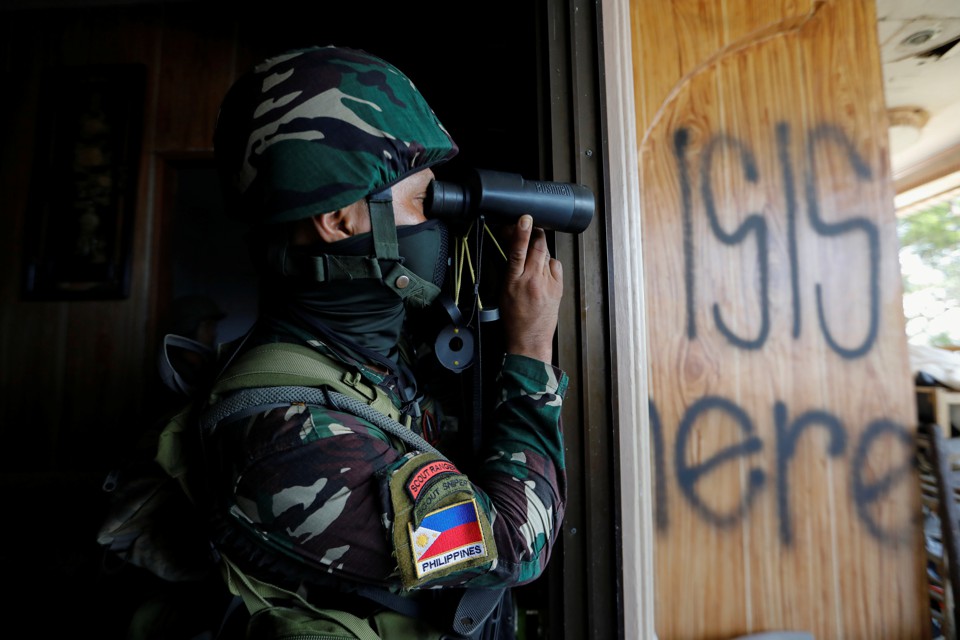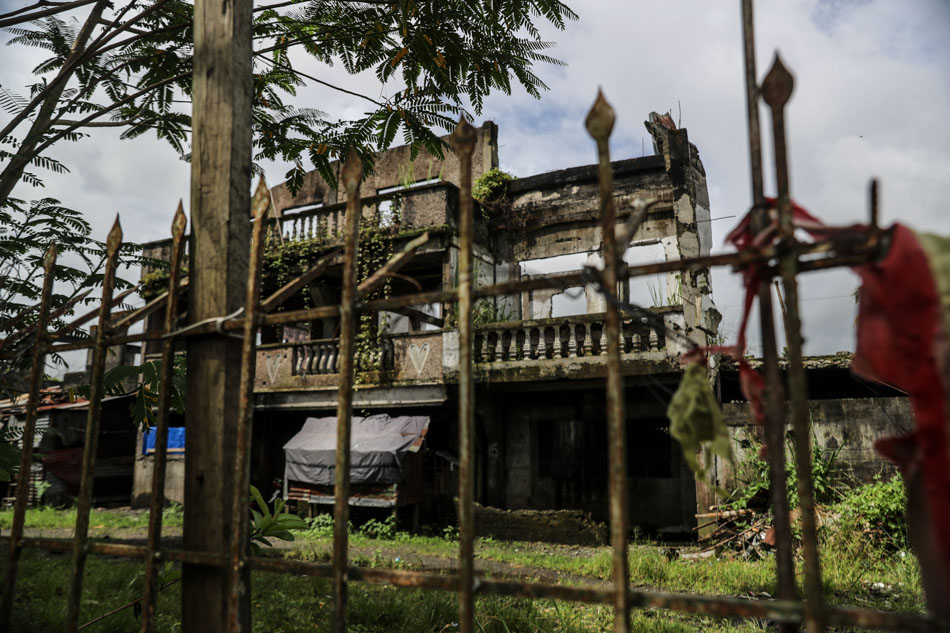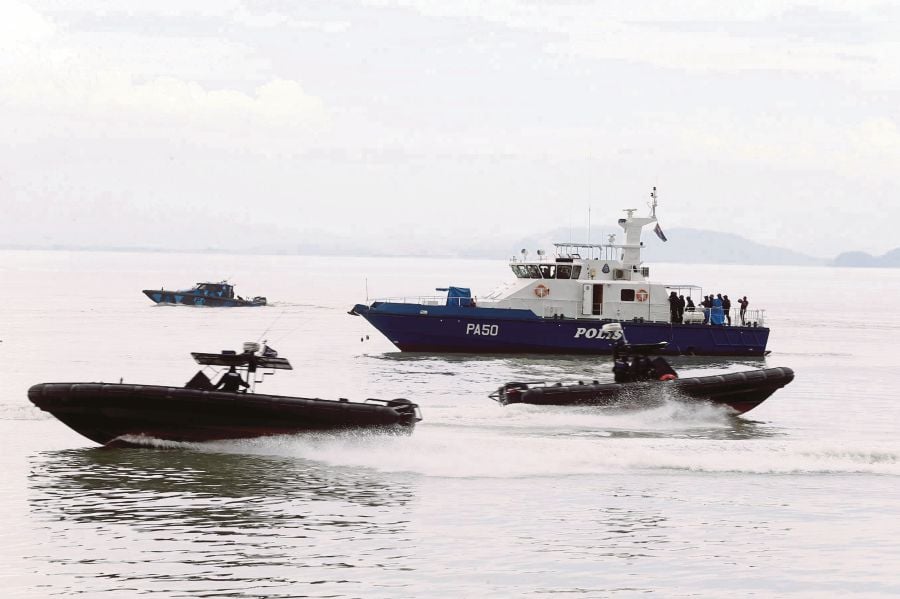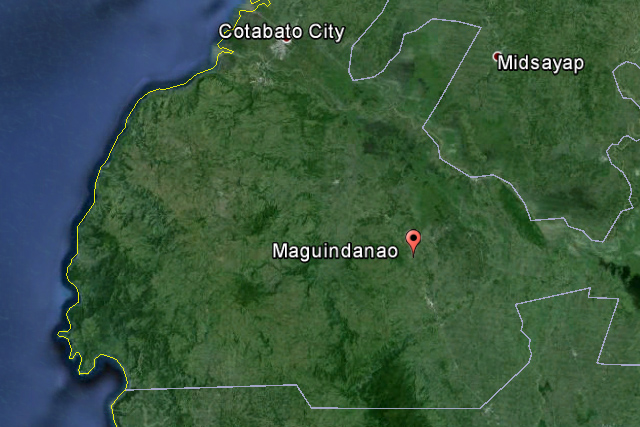From The Atlantic (Aug 12):
How Two Brothers Took Over a Filipino City for ISIS (By Ana P. Santos)
The country has a history of separatist movements. But it had never seen an extremist takeover like this.
 A Filipino soldier uses binoculars as government troops continue their assault against insurgents from the Maute group in Marawi city, Philippines, on July 1, 2017
A Filipino soldier uses binoculars as government troops continue their assault against insurgents from the Maute group in Marawi city, Philippines, on July 1, 2017
Amer Hamzah Lucman last saw Omar Maute at their high school reunion around five years ago. While Lucman’s memory is fuzzy now, he remembers plenty of good-natured ribbing and reminiscing, and Maute talking about how being in the company of old friends made the world’s problems seem to fade away. The next time Lucman heard from Maute was on May 30, under decidedly horrific circumstances that may have long-term implications for regional security and transnational terrorism.
One week earlier, a group of pro-ISIS fighters led by Maute and his brother, Abdullah, overran Marawi City, on the southern Philippine island of Mindanao. Armed men wearing black masks went on a rampage, festooning the city with ISIS flags as they conducted jailbreaks, killed Christians, and torched homes and schools—including Dansalan College, where Lucman and Maute had attended high school. The coalition of local rebels and foreign fighters foiled a military attempt to arrest Insilon Hapilon, leader of jihadist militant group Abu Sayyaf, and surprised the government troops with their force, numbers, and level of preparedness. Residents fled in droves, even as the national security adviser declared that the government was “in full control of the situation.”
President Rodrigo Duterte, then on an official
visit to Russia, cut his trip short and flew back to the Philippines. He immediately declared martial law across Mindanao,
warning that “I’d be as harsh” as Ferdinand Marcos, the former Philippine president whose nine years of martial law were marked by grave human rights abuses, violence, and corruption.
During the siege, Maute and his band of ISIS-inspired fighters had taken several teachers and a Catholic priest hostage at their former school. School authorities were trying to negotiate their release and Maute would only speak to someone he knew. The task fell to Lucman, who was the representative of his high school class and an active member of the alumni association.
“It was surreal,” Lucman recalled. Initially, the two spoke as old classmates exchanging pleasantries. Then the talk turned to the hostages. Maute assured Lucman that the hostages were “doing okay,” before going on to justify his reasons for the siege.
“I couldn’t really understand what he was saying. Our beliefs [about Islam] are different. I wanted to focus on the hostages,” Lucman said. But the conversation ended with Maute saying that release of the hostages was no longer up to him.
Lucman couldn’t believe he was talking to Maute. “The Omar I talked to that day was not the Omar I remember from high school,” Lucman said.
As the fighting dragged on, Duterte moved to extend martial law beyond the 60 days allowed by the constitution. On July 22, Congress, by an overwhelming majority, approved Duterte’s request to extend martial law in Mindanao until the end of the year. Close to three months of fierce fighting and aerial strikes have now displaced more than 500,000, killed more than 500, and reduced much of Marawi City to rubble. Lucman and his family remain displaced, while rebels
continue to hold the Catholic priest and about 100 others as hostages.
As ISIS continues to lose ground in Iraq and Syria, analysts say that the siege of Marawi has emboldened and excited jihadists across southeast Asia, including in Indonesia, and will have long-term repercussions for extremism in the region. “I know a lot of Indonesians who are thinking about joining the Maute group in Marawi. Many are looking for the next jihad. The likelihood that Marawi will become a base for ISIS is very, very high,” Iqbal Hussaini, a former Indonesian gunrunner,
said in an interview with The Australian.
In early August, the military recaptured a strategic bridge and was reported to be closing in on the remaining 60-80 rebels holed up in the city, suggesting that the siege will soon end. But even when Marawi City is finally liberated, the government will be left to face myriad risks, including cross-border terrorism and the spread of terror cells with the capacity to recruit members and activate attacks. And many, like Lucman and his friends, will be left to grapple with profound sadness and guilt.
* * *
The Philippines has one of the longest-running separatist movements in the region, but the Islamic State takeover of Marawi represented the first time that violent extremists had taken control of part of the country this way.
“The Omar we knew is gone,” Lucman said, reflecting on his schoolmate-turned-extremist. “Another person we do not know and cannot recognize is in his place.”
A study conducted by United Nations Children’s Fund (UNICEF) among armed groups in Mindanao shows that two of the biggest factors that determine membership in such groups are the influence of family members and the nature of the indoctrination. (The study was specific to those who joined the Moro Islamic Liberation Front insurgency movement, but UNICEF says this can apply to various extremist groups.) A recruitment pitch can be based purely on a severe interpretation of religious teachings, or it can leverage painful memories of oppression such as military brutality and state corruption; it can take the form of in-person persuasion, or of propaganda transmitted through social media and messaging apps. Either way, it offers a compelling narrative that touches a nerve and stokes festering grievances in young people, whether affluent or poor.
“It is what exponentially expands the potential pool of recruits,” Sarah Norton-Staal, the child protection chief of UNICEF in the Philippines, told me.
In this case, the narrative that fed extremism was the history of state brutality against the Philippine Muslim minority, particularly during the martial law years of the Marcos dictatorship.
The Philippines
is about 90 percent Catholic, with Muslims
making up about
5 percent of the country’s 100 million people. Islam, however, predates Catholicism in the country; when Spanish colonists began forced conversions, Muslims who refused to leave Islam fled to the southern island of Mindinao to escape.
“We never surrendered. We were never subjugated by a colonial power,” Norhata Alonto, a 67-year-old resident of Marawi, told me.
Known as the Philippines’s only Islamic city, Marawi is where the country’s Muslim ancestry and heritage are preserved. Only in Marawi do minarets rather than cathedral spires stretch toward the sky, do madrasas form the norm rather than the exception, do women wear veils and men skullcaps. It is probably one of the few cities in the Philippines where pork (a favorite Filipino dish) and alcohol are not openly sold or made available.
But, Alonto, said, “What no colonial master succeeded in doing, the Philippine government did, many times over.” Alonto was referring to the decades of armed conflict between the government and separatist groups fighting for autonomy for the Filipino Muslim minority. The conflict has claimed more than 120,000 lives and has seen a series of collapsed peace deals that left openings for the formation of militia groups like the Maute (the terrorist group takes its name from the Maute brothers, Omar and Abdullah).
Laisa Alamia, executive secretary of the Autonomous Region in Muslim Mindanao (ARMM), an administrative region in the southern island, was a young girl during the martial law years under Marcos. Back then, government forces served as the president’s private army. She remembers her village being razed to the ground during a military operation, leaving several residents dead. The only reason she and her family were spared was because they were not in their village at the time. “There was no psychosocial support or development aid to speak of then,” Alamia said. “There has been no closure, no healing from this grief.”
As peace proved elusive, development and progress stalled in the region. According to the Asia Foundation, conflict-afflicted areas of Mindanao have the highest poverty levels and lowest levels of human development in the Philippines. Of the 20 poorest provinces in the Philippines, 11 are in Mindanao. Official
statistics show that 48.2 percent of families in ARMM lived below the poverty line in 2015, compared with a national average of 16.5 percent. Government data show that across all regions, the ARMM had the highest out-of-school
population at 14.4 percent, compared to the national average of 10.6 percent.
The lack of education, scarce job opportunities, and inadequate social services— together with constant displacement due to sporadic skirmishes between government troops and insurgents, as well as clan wars (locally known as rido)—fueled the brewing resentment that positioned violent extremism as an attractive choice.“We are angry at the Maute, but we are also mad at Duterte.”
“When you look at the conditions that were present in other states that created ISIS, they were also present in Mindanao,” Alamia said. She first saw radicalization emerging as a problem in 2015. There was talk in the communities of charismatic recruiters visiting madrasas and universities, luring young recruits.
“The religious message [is] really appealing to middle-upper-class young men who have experienced racism firsthand and have a grudge against society for being born Muslim in the southern Philippines,” said Justin Richmond, executive director of impl.ph, an NGO that works on countering violent extremism in southern Philippines. “Educated young men from affluent clans often become the higher-level fighters. They are the ones to lead the movement and plan large-scale operations.”
* * *
A promise of hope and change carried
Duterte to the presidency in June of 2016. He is the first Philippine president from Mindanao. Much of his populist appeal stems from his more than two decades as mayor of his hometown, Davao City, where he developed a reputation for improving economic conditions. His election, in turn, signaled the end of decades of neglect for Mindanao.
But despite his affinity with the region and its people, Duterte did not focus on protecting them from the looming threat of extremism, instead choosing to concentrate his security forces on a crackdown on illegal drugs.
Last September, the members of the Maute terror group were linked to a bombing incident in Duterte’s hometown. Then, in November, the Maute brothers
tested Duterte again when they took over their hometown of Butig in Mindanao and hung the ISIS flag there. With his characteristic braggadocio, Duterte said the following month that he would not negotiate with terrorists. He promised that, with a little bit of salt and vinegar, he would “
eat the liver” of terrorists. He also challenged the Maute. “They threatened to go down from the mountains to
burn down Marawi. Go ahead, be my guest,” he
blustered.
In May, the Maute group, alongside members of Abu Sayyaf and other bandit groups, did just that: They seized Marawi, setting buildings on fire as they went along.
Now, some of those who voted for Duterte are displeased with his actions.
“We are angry at the Maute, but we are also mad at Duterte,” said one 40-year-old decorator who gave his name only as Norodin, as he waved his hand to include the hundreds of others sitting in a public gymnasium that had been converted into an evacuation center for those displaced by the Maute. Although Norodin’s home now consists of a tiny square mat, he managed to crack a joke—“The Maute, they not only ruined city, they also ruined my day!”—even as he reiterated: “We are all angry.”
It hurt Norodin and other Muslims when Duterte jokingly told soldiers fighting in Marawi that they could rape three women and he would protect them. It angered them when Duterte called for aerial strikes and said that he would “carpet bomb” the city, since it was up to civilians to run for safety.
“We campaigned for him. We voted for him. We wanted him to win,” Norodin said. “And this is what he does to us? He jokes about raping our women and burning our homes!”
On July 24, Duterte delivered his second State of the Nation Address. Marawi, the site of the biggest crisis his administration has faced, was expected to receive plenty of airtime.
Zia Alonto Adiong, a spokesperson for Joint Task Force Marawi, flew to Manila to attend the speech. He left disappointed. There was brief mention of the suffering of evacuees and talk of rebuilding Marawi, but the president focused more on military solutions, like building up defense capabilities. “I understand the president’s declaration of support for the military, but it is not only the soldiers who are dying. Evacuees are also dying,” Adiong said. “The [speech] would have been a perfect opportunity to lay out plans for taking care of the evacuees and the rebuilding of Marawi.”
Crucial to the rebuilding of Marawi,
analysts say, will be the government’s willingness to take extra measures to quell potential anger against it, by safeguarding the dignity of evacuees and respectfully rebuilding mosques and religious structures.
Maute fighters, for their part, are already weaving another narrative of state brutality, as Telegram messages intercepted by IPAC show. “We did not destroy Marawi. We did not bomb it to ashes … We never intended harm to the city and its people,” read a July 15, 2017 Telegram posting.
To security expert and IPAC director Sidney Jones, one thing is clear: “The risks won’t end when the military declares victory.”
Addressing violent extremism will require looking beyond military solutions. Brokering peace with other insurgent groups will promote security, as will development projects that address root problems of scarce opportunities and education. Because of its reach, the problem calls for heightened regional cooperation and intelligence sharing, particularly between the Philippines, Indonesia, and Malaysia. And because of its complexity and nuance, it requires analysis of messages on social media and a detailed mapping of terrorist personalities to better understand their motives for taking up jihad.
“The Philippines will be playing catch up,” Jones said. “It should have been involved in looking at this five years ago."
https://www.theatlantic.com/international/archive/2017/08/philippines-isis/536253/






















